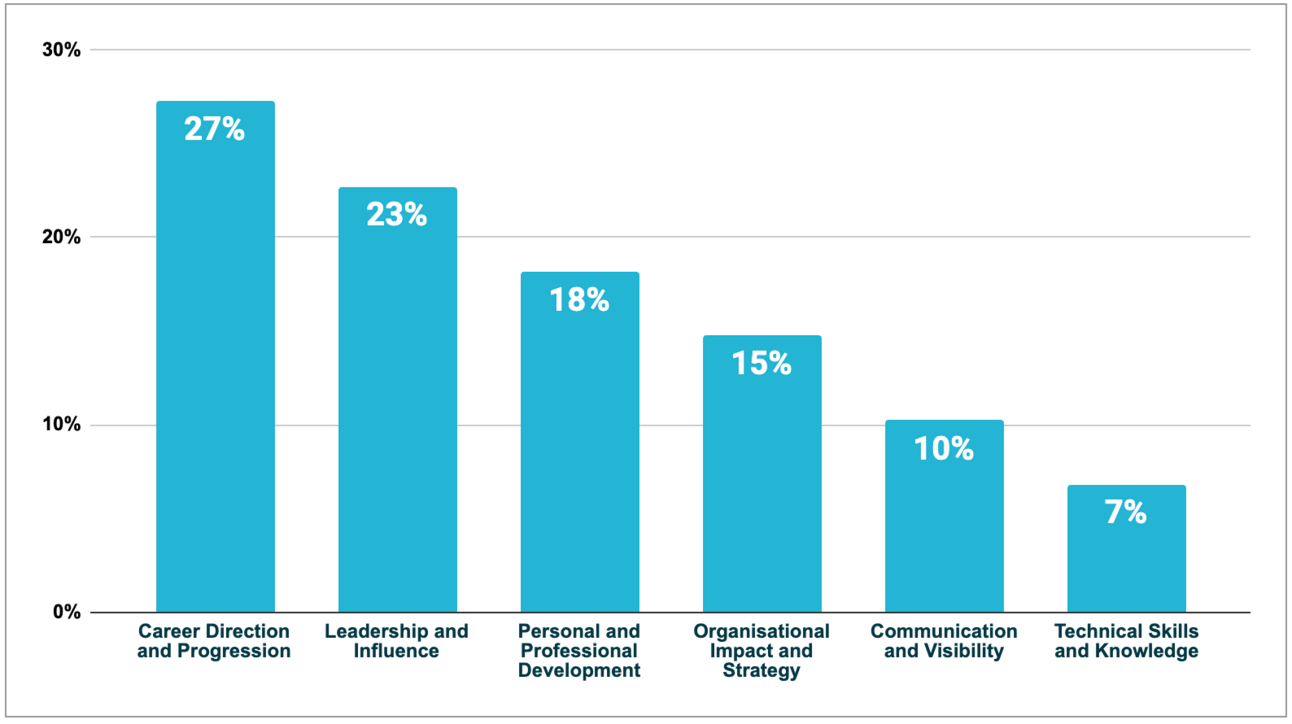
Top concerns for data leaders
I couldn’t call this newsletter “Strategies For Effective Data Leadership” if I didn’t call out and highlight the top things that are challenging people in, or wanting to go into, data leadership positions.
In today’s post, I’m going to take a deep dive into the data I’ve collected from surveying well over 100 data leaders about their biggest challenges.
What troubles Data Leaders?
I work with people around the world as a data leadership coach. When they book time to talk, I start by surveying them on why they want to speak to me.

The chart below outlines the top response categories I receive from Data Leaders:

Why this chart is interesting:
Probably the biggest surprise present in this chart is that Technical Skills and Knowledge are at the bottom of the list.
Data is still broadly considered to be a technical discipline across sectors and industries. Hiring in the space is still heavily focused on technical capabilities and hands-on skills with tech and tools. Even for very senior data roles (which is a mistake IMO).
None-the-less, the data leaders who reach out to me are preoccupied with other concerns.
Namely:
Career Direction and Progression
Leadership and Influence
Personal and Professional Development (to a lesser extent).
Breaking things down a little further, under each of those top 3 concerns, here are the core components:
Career Direction and Progression
Establishing a structure for progression towards a more senior position.
Deciding on the next steps in career progression.
Identifying roles suited to skills and interests.
Leadership and Influence:
Improving executive presence and leadership thinking.
Creating a culture of trust and clarity within the organisation.
Enhancing skills to influence senior stakeholders in data strategy.
Building and maintaining strong relationships with executives and peers.
Personal and Professional Development:
Understanding areas for development and best approaches to new learnings.
Developing strengths and deciding on career direction.
Building confidence to advocate for a team and dedicated budget.
Obtaining an independent assessment of career progress and self-talk improvement.
While this doesn’t constitute the world’s most comprehensive research into data leader’s challenges, it does highlight a few issues many of us are all too aware of:
It’s tough being a leader in data.
🤷♂️ Data Leadership Careers are rarely clear cut.
Data leadership is rarely the same from one company to the next. Most organisations have a tricky relationship with data as it is, without having to also figure out ideal career paths and progression for their data professionals.
In many respect, data leaders themselves are responsible for carving out their own purpose and reason for being within a lot of organisations. Often against conflicting points of view and in some cases, outright hostility.
It comes as no surprise that many ambitious data leaders are ill-equipped for the fight, and lack any sort of strategic framework for taking on the challenge.
To combat this, you need a plan.
It would be impossible to lay out the entire strategy for this in one email and of course, every company is different so strategies will change depended on individual circumstances.
So, you need a bespoke plan.
But to put it simply, you need to work out exactly what you want from your data leadership career (your ideal outcome) and to design a plan to achieve that.
🌟 Become an influencer.
Fighting for a more data centric culture within the organisation is a type of ‘cultural transformation’.
To create more data-centric organisations and by extension, to grow our own influence as data leaders, we need to acquire trust and respect from our business leadership peers.
We don’t do this by being corporate wallflowers.
Influential people acquire influence and use that influence to inspire, persuade and lead their organisations toward the light.
To accomplish this, you need to hone your people skills. It won’t matter how good you are at SQL, Python or Tableau. This cannot be achieved with your nose in a spreadsheet. You’ve got to talk to people. You’ve got to listen to people. You’ve got to help them solve their problems.
Do this and the rest will follow.
⛹🏼♀️The path from player to coach.
Most people (all people?) start their data careers as individual contributors.
I mean, this is true of all disciplines, but one of the core differences between data and other business disciplines is that data is often erroneously considered to be a purely technical discipline by people getting started in their careers (and many well into their careers mind you).
This serves you for a while, so long as you’re happy being an IC. But at some point many realise that most of the the career progression lies on the other side of the fence: in people and team management.
Some go willingly, other are promoted/expected to pick up the reigns as the most obvious candidate. Neither are prepared for the task that lies ahead.
And so, at this career junction, it’s sink or swim for many new data leaders. Ill-equipped for their new role in data leadership, and largely unaware of what opportunities or challenges lie before them, they begin a mad rush to level up.
💡Get a handle on your data career.
Through my coaching and consulting, I help data leaders and leadership teams develop robust data-centric cultures to help them increase accuracy and velocity around decision making to maximise ROI from strategic initiatives.
I combine my extensive career experience as a Global Head of Data within a Fortune 500 alongside my experience as a consultant, coach and mentor to work with leaders to develop a company wide, data-centric culture that will ensure organisations are in the right place to maximise their growth potential.
If you’d like to schedule a free 1:1 chat about data leadership coaching, grab time with me here: https://calendly.com/tristanburns/30min
⚡️Whenever you are ready, there are a few way I can support you:
1:1 Data Leadership Career Coaching
Excellent LinkedIn Content
Google Analytics, Tagging and Looker support
